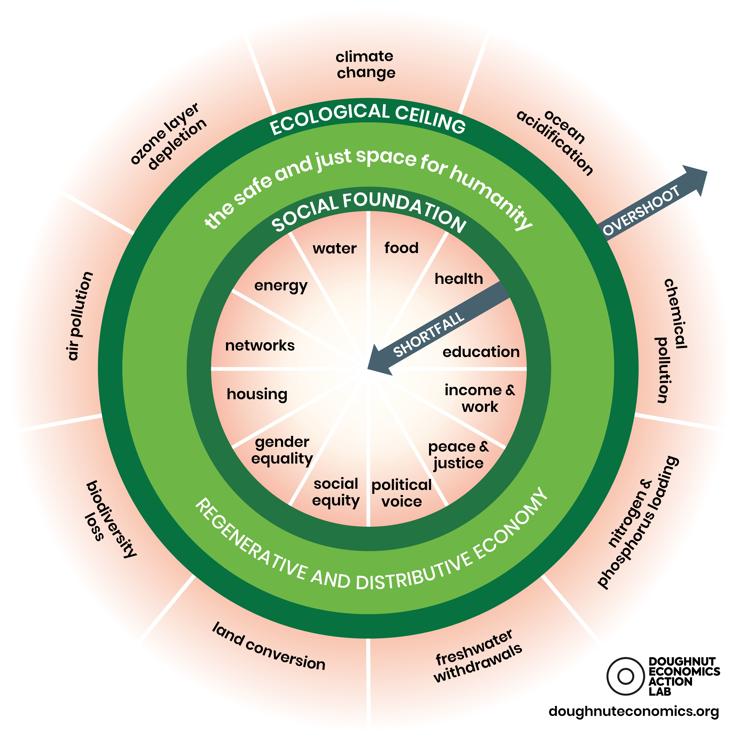UCLan to host public online seminar on community wealth building and 21st century economics as part of collaborative research project with Preston City Council on Place-Based Climate Action Network initiative
Researchers from the University of Central Lancashire (UCLan) are inviting people to a free online seminar to learn about community wealth building and 21st century economics.
When Preston Meets the Doughnut will take place on Thursday 4 February from 3:30pm-5:30pm.
Attendees will hear from three high-profile speakers who will discuss the Preston Model, an economic strategy which aims to keep more investment, jobs and trade in the local economy so that the benefits can be shared more widely with local people, communities and businesses, and the regenerative and distributive Doughnut Economic Model, which puts an emphasis on wellbeing, a healthy environment and the concept of “thriving” by aiming to meet human needs within planetary boundaries.
Councillor Matthew Brown, Leader of Preston Council and a driving force behind the transformative Preston Model, is one of the three key speakers. He will be joined by Kate Raworth, Author of Doughnut Economics: seven ways to think like a 21st century economist and senior research associate at the Environmental Change Institute, University of Oxford and John Barry, Professor of Green Political Economy at Queen’s University, Belfast and Co-Chair of the Belfast Climate Commission.
"‘As we look toward economic recovery from the pandemic it is vital we do not return to the old way of doing things. Instead we must take bold action to explore new methods of ownership and new ways of working together to make money work for our communities and make better decisions that benefit society and the environment."
— Councillor Matthew Brown, Leader of Preston Council and key speaker at the event.
Councillor Brown said: ‘’As we look toward economic recovery from the pandemic it is vital we do not return to the old way of doing things.
“Instead we must take bold action to explore new methods of ownership and new ways of working together to make money work for our communities and make better decisions that benefit society and the environment.
“I am excited to be speaking at this important event and excited that the council will be launching its new Community Wealth Building Strategy on 25 February 2020 setting out our priorities to build toward an economy that focusses on people over profit.”
The webinar is being organised by UCLan’s Research Institute of Citizenship, Society and Change (ICSC) and will contribute to a new project, Integrating climate resilience and social justice into a framework for recovery in Preston after Covid-19. Funded by the Place-Based Climate Action Network (PCAN), the 15-month project brings together UCLan researchers with volunteer community researchers and with colleagues from Preston City Council, Community Gateway Association and Climate Action Preston.
UCLan’s Professor Mark Dooris, who is leading the project, commented: “By harnessing organisational and community experiences of the COVID-19 pandemic and exploring how the Preston Model and the Doughnut Model can be brought together, the project hopes to inform future action to tackle the climate emergency, promote economic and social benefits for local citizens, and help Preston bounce back after the COVID-19 crisis.”
"By harnessing organisational and community experiences of the COVID-19 pandemic and exploring how the Preston Model and the Doughnut Model can be brought together, the project hopes to inform future action to tackle the climate emergency, promote economic and social benefits for local citizens, and help Preston bounce back after the COVID-19 crisis."
— UCLan Professor Mark Dooris, Lead on the Integrating climate resilience and social justice into a framework for recovery in Preston after Covid-19 project.
The UCLan and Preston City Council application was one of 150 whittled down to a final of three projects and three fellowships awarded the funding from PCAN.
Professor Sam Fankhauser, principal investigator for the ESRC-funded PCAN, said: “I am extremely pleased with the outcome of the 2020 PCAN Fund round. The three winning projects will make a rich and diverse contribution to place-based climate action, teasing out climate governance challenges, exploring place-based ways for a net-zero recovery from Covid-19, and addressing the growing challenge of climate resilience.”
Anyone interested in joining the webinar can register online.


